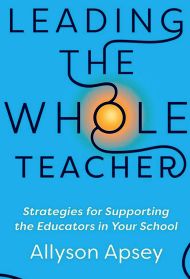Strategies for Supporting the Educators in Your School
REVIEWED BY TODD FULLER, MSTA DIRECTOR OF MARKETING AND COMMUNICATION

Few of us would be bold enough to hand a book to a principal or administrator and say, “You should read this. We will both be glad you did.” However, Allyson Apsey’s, Leading the Whole Teacher: Strategies for Supporting the Educators in Your School, would be a good choice if you were considering a recommendation for an administrator in your district. Leading is one of many quality books under the Dave Burgess Consulting name. What I appreciate about Burgess published books is the addition of action items. Most of the books provide more than examples and anecdotes, and Leading is no different. Each chapter includes ideas that can be implemented almost immediately, as well as specific questions for collaboration and reflection. Given that the book was published in 2022, many of the given examples focus on how districts and teachers dealt with COVID and how they are now dealing with the ramifications of closed schools, student behavior and increased pressure to achieve in an environment that our generation has never experienced. While obstacles in the way of student learning seem insurmountable, this is where Apsey’s work shines. In the first chapter, she asks two questions that teachers rarely get the opportunity to hear: What do teachers want from leaders? And what can leaders do for teachers? Much of the book focuses on answering those two simple, yet powerful questions. Apsey challenges the reader to ask, “What does a school look like when teachers are set up for success? What does teacher success mean for student success and achievement?” She asks us to consider the elements of a healthy workload, valued educators, continuous leaders, emotional safety, decision-making and positive relationships as the basis for what is needed to lead the whole teacher. Whether administrators or lead teachers like it or not, the success of a school depends on work-life balance and the emotional well-being of their colleagues just as much as it depends on subject knowledge and the ability to help students retain information. Thankfully, Apsey does not try to do what most “self-care” books do, which is offer blanket solutions meant for every district and community. She recognizes that emotional safety looks different depending on location and learning environment. For example, Apsey shares responses from rural teachers when asked, “What might make a teacher feel unsafe at school?” Gossip and bullying were high on the list, but so was mud. Apsey explains, “. . . mud poses a safety concern in the area because heavy rainfall results in muddy and hazardous roads.” Safety and self-care vary from educator to educator, so leaders should be willing and able to recognize those differences. As mentioned above, school leaders can be more than principals or administrators. Team leaders and mentors will also benefit from Leading the Whole Teacher. Experienced teachers can help those new to the profession recognize the importance of protecting healthy workloads. This is outlined in Chapter 7 as Apsey says, “We’d like teachers to head home after a day of teaching feeling satisfied and fulfilled, and we want them to have a little energy left in their tank for their personal lives. We know this is good for teachers. We know this is good for students.” Those who have been in the profession for years can model and explain what it should feel like to be in control and how they handle work at night and on weekends. Advice from colleagues may have more credibility than the same advice from a principal. Finally, Apsey does something that I see in many educators’ books, but not as much in books from other disciplines. Apsey provides ways to keep the conversation going and gives the reader ways to stay in contact. She recognizes that just as the examples and anecdotes she uses now are timely, our thoughts of how COVID shaped the education process will fade. New challenges will arise for educators and education leaders to face. However, the fundamental messages found in Leading the Whole Teacher will still resonate. Her ideas will still be relevant years from now, and leaders will be able to check-in with Apsey to see if she has any new insight that will surely complement her existing work.
Listen to the MSTA Presents podcast with Allyson Apsey here.
